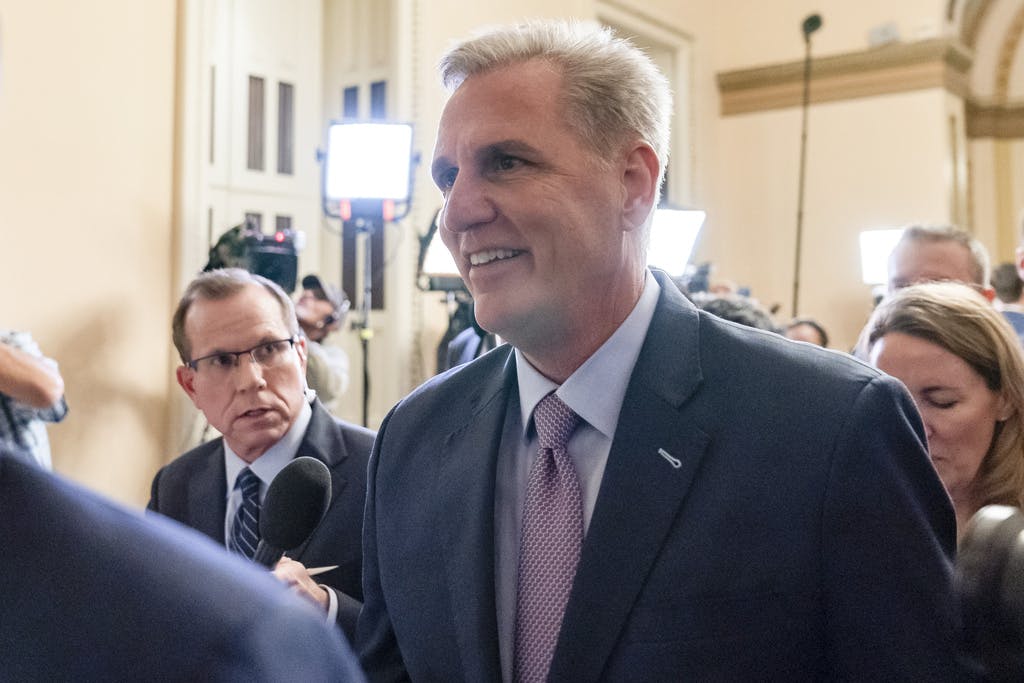On Ukraine, the Ousted Speaker Shows Leadership Biden Is Lacking
Congressman Kevin McCarthy makes a forceful and compelling argument for continuing the American supply of funds and arms to Kyiv, which some in his party, and even more in the public, are now resisting.

The rationale for supporting Kyiv offered by the ousted House speaker, Kevin McCarthy, is the kind of reasoning one might have expected President Biden to deliver amid growing Ukraine fatigue and the risk that America could lose the most consequential battle yet in the new Cold War.
Mr. McCarthy’s comparison between President Putin’s invasion of Ukraine and Hitler’s maneuvering on the eve of World War II was made Tuesday, while all eyes were on him in the aftermath of the vote to vacate the speakership. The deposed speaker made a forceful and compelling argument for continuing the American supply of funds and arms to Kyiv, which some in his party, and even more in the public, are now resisting.
“Support for the Ukraine war is starting to erode,” the editor of the Foundation for Defense of Democracies’ Long War Journal, Bill Ruggio, tells the Sun. “Our failure stems from not making the case in public.”
Mr. Biden was often criticized for being too slow in supplying arms that Kyiv said it needed. Yet, the president, more than any other world leader, is helping the war efforts by providing advanced tanks, planes, artillery, and other sorts of weaponry. Under Mr. Biden, America has backed Kyiv with arms, funds, and diplomatic support more than any other Western country.
As of yet, though, the commander in chief has refrained from making a prime time televised speech to the nation, or otherwise explaining comprehensively why taxpayers have backed Ukraine to the tune of $75 billion since the February 2022 invasion — and why more is needed.
What the public is hearing are partial explanations made in the context of political sniping. “A lapse in support will make Putin believe he can wait us out, and that he can continue the conflict,” the National Security Agency’s spokesman, John Kirby, quoted Mr. Biden as telling Mr. McCarthy in budget negotiations on the eve of last week’s threat of a government shutdown.
Mr. McCarthy then kept a White House request for an additional $24 billion in war funding out of an agreement with Democrats to keep the government funded until mid-November. Ending a long answer to a Ukraine question on Tuesday night, Mr. McCarthy explained that addressing the border crisis must precede any agreement on funding Kyiv.
Yet, his rationale for continued support of the war efforts was far more convincing than the partisan shots from the White House.
“A lot of actions that Putin takes are very similar to Hitler,” the ousted speaker said. The Nazi leader had fought in World War I, and he “hated that his country collapsed, and they signed the treaty of Versailles.” Similarly, Mr. Putin has been a KGB agent who “hated that his country collapsed to the West” in the aftermath of the Cold War.
Hitler built his army in violation of the Versailles treaty with little pushback from world powers, Mr. McCarthy added. The Nazi leader invaded Czechoslovakia, annexed Austria, and, in negotiating a “peace” treaty with Britain’s Neville Chamberlain, “he saw signs of weakness.” Similarly, Mr. Putin invaded Georgia and parts of the Donbass and annexed Crimea, “and world powers really didn’t say much,” he said.
Before World War II, Hitler created an axis with Japan and Italy, which were led by dictators who “wanted to expand their sphere of influence.” Before his invasion, Mr. Putin also created “an axis of power with China, North Korea, and Iran — all countries that want to expand their sphere of influence.” That axis, Mr. McCarthy said, is “even worse than in the 1930s.”
Mr. McCarthy did partially blame Mr. Biden, noting that when, as a congressman, the future speaker returned from visiting Ukraine after the 2015 Crimea invasion, he joined a group of legislators who went for a White House meeting. They asked to supply Ukraine with anti-tank Javelin missiles to defend against Russian would-be invaders. Yet the group was rebuffed by the then-vice president, who was charged with Ukraine policy.
Similarly, Mr. McCarthy said President Biden removed sanctions over Russia’s Nord-stream 2 gas pipeline to Europe and got nothing in return. Mr. Putin “misreads that and invades Ukraine, thinking it will collapse in two weeks” like Afghanistan after the chaotic withdrawal, which “will present challenges for us in the next two decades,” Mr. McCarthy said.
The Ukraine tables have now turned. It is Mr. Biden who is the most avid cheerleader for aid to Ukraine. Most Republicans remain supportive even as they demand better accounting for where the funds are spent. Yet, a small number of GOP representatives are calling for cutting all support.
“We have got to bring the parties to the table and have a peace accord,” one of the eight Republicans who voted to oust Mr. McCarthy on Tuesday, Representative Matt Rosendale of Montana, told the BBC. While such appeasement still represents a minority of Americans, it is bound to grow as the war drags on.
Rather than constantly blaming “MAGA Republicans” for war fatigue, Mr. Biden needs to publicly tell the nation why supporting Ukraine is an American interest. On Wednesday, he said he intends to make such a speech. Taking pointers from Mr. McCarthy’s Tuesday press conference could be a good start.

